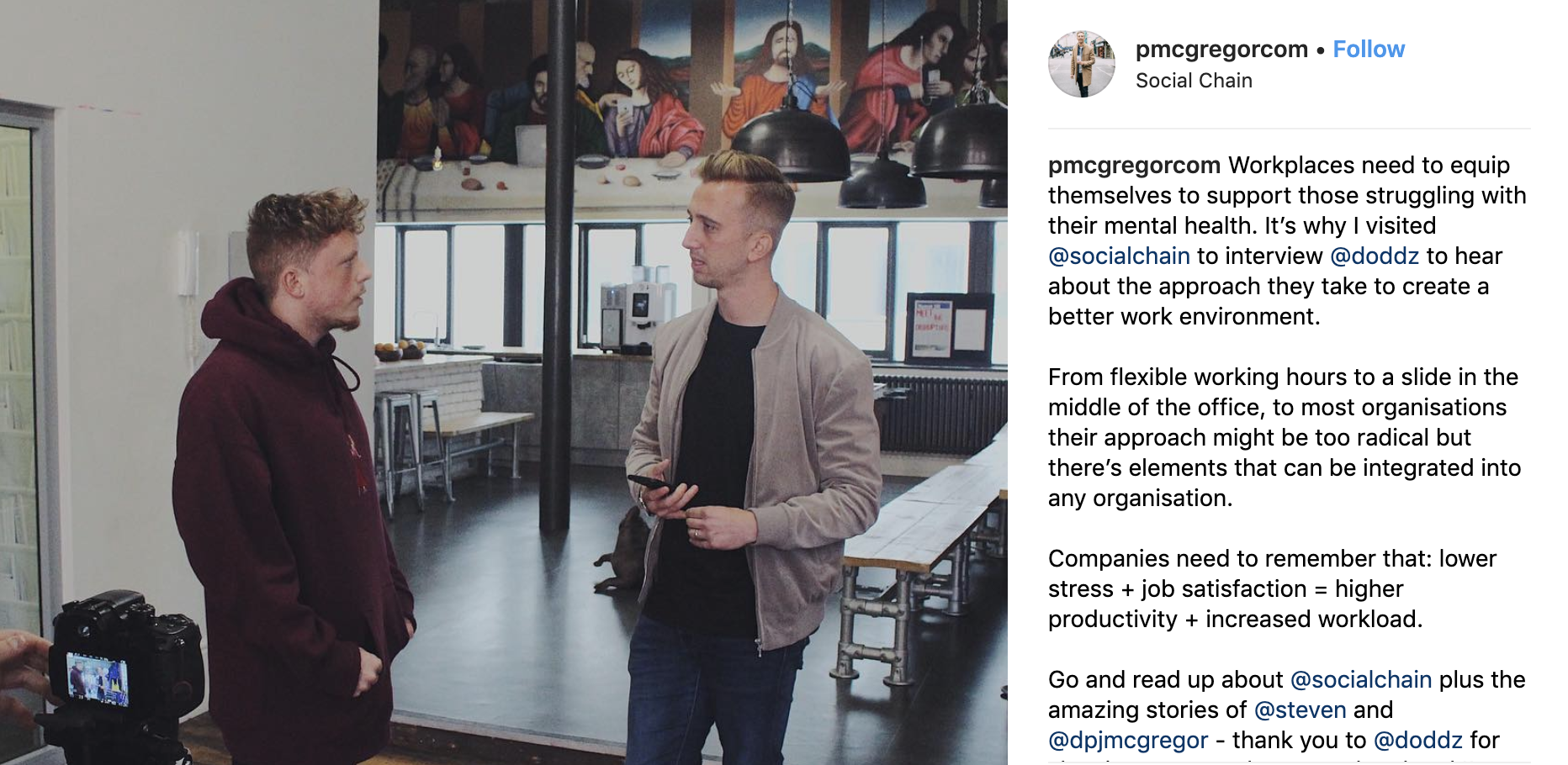The awareness around mental health is rising, and rightly so. Suicide remains the biggest threat to all employees aged 20-35, alongside men under the age of 45. In fact in a recent survey, in a company of 1,000 employees, they found that 167 colleagues were currently struggling with some form of mental health issue, 400 colleagues had experienced a problem at some point but felt unable to discuss it, and there was 3,841 days lost per year due to work-related stress, depression and anxiety.
Now I’m not suggesting that the workplace is fully to blame for these statistics, of course mental health issues go far deeper than that, but organisations can certainly do more to proactively improve the mental wellbeing of their employees.
Already, many organisations have realised a shift in where and how people work is leading to increased productivity and job satisfaction. But just like physical health needs to be supported in the workplace, mental health in the workplace needs to become a priority too.
But why? Why should you as an organisation prioritise mental health in the workplace?
Well here’s 5 reasons…

It’s Your Duty of Care
If an employee was struggling with a physical health issue, how would they be supported within your organisation? Now compare that to someone struggling with a mental health issue. Right now, many organisations are taking the old school approach by simply reacting to mental health problems, and not implementing proactive support strategies.
As an employer, you have a duty of care to your employee to do all you can to support them through any wellbeing related issue. Ignoring and rejecting a mental health problem because it’s something that you might not be able to understand personally or support, isn’t you doing the best you can for that employee. There’s a huge lack of understanding, compassion and proactive strategies within many organisations which simply lead to them turning a blind eye to it happening. With that being said, it’s also not your responsibility to fix them. It’s not your responsibility to step into the role of therapist, and deal with the issues they’re personally facing.
As an employer, you’re there to support them in the best way you can through getting the professional help they deserve.
If someone broke their leg you wouldn’t ignore them, you also wouldn’t try to operate. You’d sit with them, support them through it, and sign post them to professional help by calling an ambulance. If someone is struggling with depression, let’s not ignore them, and let’s not feel like we need to become their therapist. Instead, let’s support them, show compassion, and sign post to the relevant professional support systems available to them.
I explain more in this post and video.
Absenteeism
As stated, in a company of 1000 employees it’s suggested that 3,841 days are lost per year due to work-related stress, depression and anxiety. Now even if stress isn’t the answer that Jane has given to you on the phone when she called in sick this morning, it doesn’t mean it isn’t the reason.
If someone is physically unwell, the thought of them going into work can be challenging. When someone is mentally unwell, the thought of them going into work can also be challenging. This is when stigma within the workplace can really become an issue. Creating a safer environment for employees to talk about how they feel, to be able to turn to someone in times of need can help reduce absenteeism. Often or not people struggling with a mental health issue withdraw from work because it’s not helping their mental health. They need time alone, for self care, to be able to start dealing with how they feel.

At a recent ‘Lunch and Learn’ talk I delivered in London I asked the question to 60 people: “How many of you here have struggled with mental health in the past 12 months”. Around 90% of the room held their hand up. 10 minutes later I asked: “How many of you would feel comfortable telling a colleague you were struggling with mental health?” and a staggering 2 people raised their hand.
“Forty-two per cent of staff experiencing a mental health issue have pretended to suffer from a physical health problem when calling in sick, suggesting there is still some work to be done to “normalise” poor mental health at work.”
Is the work environment provided a safe and open space for them to tell someone how they feel? As a manager/company, do you accept when someone may need some time off because of their mental health or do you expect them to pull their socks up and get on with it? Prioritising the mental wellbeing of your employees will reduce working days lost, leading to more work hours, more productivity and in many cases, more profits.
Presenteeism
I’m not sure who made this word up, or whether it’s a word in that case, but by your company focusing on the mental wellbeing of it’s employees you’re going to increase productivity and get better results.
Sure, your current approach to mental health at work has bums on seats… but how many of those employees are driven to succeed? Are productive? Are energised? Are happy?
I know this sounds simpler than it is, but happy employees lead to better results. Those struggling with stress, depression, anxiety or any other mental illness will probably struggle to reach the expectations you’ve set them. Those who feel judged, not listened too, misunderstood and not supported will probably struggle to reach the expectations you set of them too.

There really is no one size fits all approach to making your employees feel motivated to deliver on results. The promise of a pay rise or beers to celebrate on a Friday night isn’t enough to please every one within the workplace. Every one is different, every one has different expectations, goals, desires, ways they manage their mental health, priorities and ways of working. Listen to them. Don’t dictate to them. And you’ll have more chance of them delivering results in return.
If focusing on the mental wellbeing of your staff isn’t a priority still, think about the results you can get from happy staff. Productive staff. Motivated staff.
“You work for your employees, they don’t work for you” – Gary Vaynerchuk
Employee Retention
Following on from the last point, happy employees work harder, and happy employees also stay longer. How much time, money and resources do you spend each year replacing old employees? Employees that have gone looking for a job more meaningful, a job with potentially better prospects or a job that suits their lifestyle more?
The company Social Chain is a great example of this. They prioritise the mental wellbeing of their staff by providing flexible working hours, health benefits such as gym memberships, a full time Director of Happiness, unlimited holiday, a relaxed working environment and projects that involve and excite those involved.
I recently visited Social Chain HQ in Manchester and spoke to employee (a lose term) ‘Doddz’, where he explained the benefits of working for a company like Social Chain. He said gym memberships are often provided by companies now, but the strict structure of work hours means employees struggle to find time to exercise. Social Chain allow flexible working hours (meaning you have to be in by 11am) which means he has the option to go to the gym in the morning before work.

This again summarises the earlier point of every employee being different. Some employees lead to burnout because they’ve missed tucking their children into bed every night due to the strict working hours. Other employees find they’re more productive in the evenings, and a later morning start would mean they get the time to see family and go to the gym.
When we prioritise the mental wellbeing of our employees, they’re likely to overdeliver in results but also stay at the company for longer.
Lead The Way
Finally, the reason why your company needs to prioritise mental health within the workplace is because it’s time to lead the way. It isn’t 1981 anymore. Before we know it, the generation which many label ‘The Snowflake Generation’ will be leading organisations. As a company, showing that you care for it’s workforce, that you proactively look to improve the mental wellbeing of your staff will enhance the company reputation. Employers that focus on a progressive approach to mental health in the workplace will change the business landscape over the next decade.
Will you become one of them?

These 5 reasons may read easy, but to implement they’re obviously a lot harder. But please start. You’re not being asked to change the work environment completely overnight, all I’m suggesting is that you start making mental health a priority. You start putting things in place to support and improve the mental wellbeing of your staff.
After all, what company doesn’t like higher employee retention, better productivity, less absences and better results?
Share This On
If you found this article helpful, please share it on. And if there’s any way I can help your organisation implement any of the above, please connect with me.













